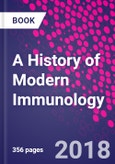A History of Modern Immunology: A Path Toward Understanding describes, analyzes, and conceptualizes several seminal events and discoveries in immunology in the last third of the 20th century, the era when most questions about the biology of the immune system were raised and also found their answers. Written by an eyewitness to this history, the book gives insight into personal aspects of the important figures in the discipline, and its data driven emphasis on understanding will benefit both young and experienced scientists.
This book provides a concise introduction to topics including immunological specificity, antibody diversity, monoclonal antibodies, major histocompatibility complex, antigen presentation, T cell biology, immunological tolerance, and autoimmune disease. This broad background of the discipline of immunology is a valuable companion for students of immunology, research and clinical immunologists, and research managers in the pharmaceutical and biotechnology industries.
- Contains the history of major breakthroughs in immunology featured with authenticity and insider details
- Gives an insight into personal aspects of the players in the history of immunology
- Enables the reader to recognize and select data of heuristic value which elucidate important facets of the immune system
- Provides good examples and guidelines for the recognition and selection of what is important for the exploration of the immune system
- Gives clear separation of descriptive and interpretive parts, allowing the reader to distinguish between facts and analysis provided by the author
Table of Contents
Introductory Words about Science, Scientists, and ImmunologyPart One: Pre-History with Far-reaching Consequences
1 The immunological revolution
Part Two: The History
2 A very special location: the basel institute for immunology
3 Immunological specificity
4 Monoclonal antibodies: the final proof for clonal selection
5 The first victory of molecular biology: mechanisms of the generation of antibody diversity
6 The major histocompatibility complex
7 Antigen processing and presentation
8 The intricate behaviour of t cells
9 Acquired immunological tolerance
10 Autoimmunity
Concluding Remarks
Authors
Nagy, Zoltan A.Dr. Nagy, a world-leading immunologist, previously held positions as Scientific Member of the Basel Institute of Immunology, Deputy Director of the Max-Planck-Institute for Biology in Tuebingen, Project Leader in Preclinical Research at Novartis in Basel and most recently as Department Head of Immunology at Hoffmann-La Roche in Nutley. Dr. Nagy's research into the major histocompatibility complex has resulted in over 140 papers in peer-reviewed journals. He's actively contributed to immunology research from 1970 to 2006 and is an author of over 150 research publications (mostly in high impact international journals). He's directly contributed to the majority of sub disciplines, the history of which is described in this book. He personally knows almost all prominent scientists in immunology including 8 Nobel Laureates. This background put him uniquely into the position of writing up the history of immunology in the last third of the twentieth century with authenticity and insider details.
He's significantly contributed to the genetics of the major histocompatibility complex (MHC), to the MHC-association of autoimmune diseases, and to different aspects of T cell biology. Formerly, he was a member of the Basel Institute for Immunology, deputy director at the Department of Immunogenetics, Max-Planck-Institute of Biology, Tübingen, Germany, head of the Immunology Department, Hoffmann La Roche Inc., Nutley, NJ, USA, and head of research at GPC-Biotech Inc., Munich, Germany. Also is a former editorial board member of "Immunogenetics?, and "Human Immunology?.








